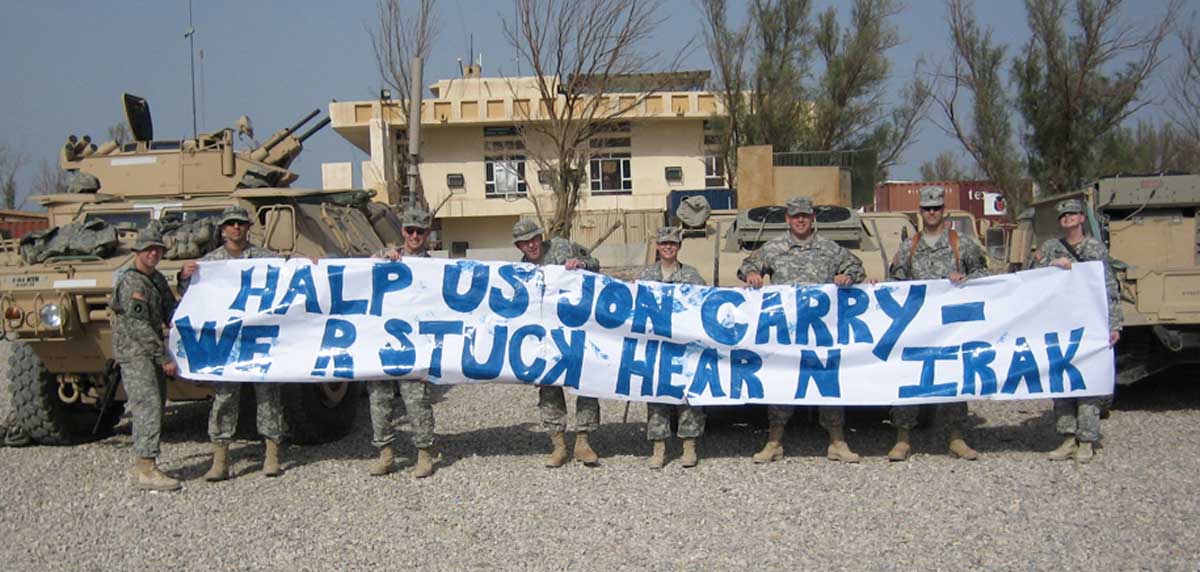
Photo from Minnesota's National Guard stationed at Tallil Airbase following a statement by John Kerry, former Presidential candidate and U.S. senator from Massachusetts, in an unfortunate choice of words at a student rally at Pasadena City College, Los Angeles County Monday, Oct 30 2006: .“You know, education, if you make the most of it, if you study hard and you do your homework, and you make an effort to be smart, uh, you, you can do well. If you don’t, you get stuck in Iraq.” (He said he had meant ?? to say "You end up getting us stuck in a war in Iraq.")
Abraham Sarah
A murderous dictator walks into a bar
Weekend Australian, Ben Macintyre, The Times, Saturday, June 28, 2008
A POLICEMAN stops a motorist and asks for a donation: terrorists have kidnapped Robert Mugabe, and have vowed to soak him in petrol and set him alight if the ransom is not paid.
"How much are other people giving?" the motorist asks.
"Oh, on average about two or three litres."
It may not be new, or very funny, but the joke represents one of the few points of light on the dark landscape of Zimbabwe. Mugabe and his thugs have killed off any meaningful election, food shortages are acute, inflation is heading for 1.5 million per cent, but one currency in Zimbabwe is steadily increasing in value - jokes. Jokes about Mugabe are a crime; anyone saying or writing anything insulting to the Government is liable to be arrested. Yet the jokes are spreading, by text message, email and word of mouth. The www.nyambo.com website is dedicated to Zimbabwean humour (nyambo is Shona for "jokes").
Question: What did Zimbabweans use for light before candles? Answer: Electricity.
There is no sound more terrifying to a tyrant than a collective snigger.
"Every joke is a tiny revolution," George Orwell wrote. Jokes alone cannot topple dictators, but anti-regime humour is the most subtle form of revolt, the slow erosion of a despot's dignity, a survival mechanism, a cathartic snook cocked at the stupidity, cruelty and hypocrisy of life under the boot.
Satire is banned in North Korea, the world's most humourless land. Earlier this month, police in Burma arrested Zarganar, one of the country's most famous comedians, who has attracted a wide following by mocking its military rulers.
"Humour," as Joseph Goebbels remarked, "has its limits." He was wrong, of course, for humour has no limits, but does have an uncanny way of seeping through cracks of the most vicious dictatorship. Iraqis laughed behind their hands at Saddam Hussein, Romanians secretly teased Ceausescu (Why does he hold a May Day rally each year? To see how many people have survived the winter), and the French Revolution was preceded by a spontaneous upsurge of ribald humour at the expense of the monarchy.
Perhaps the most extraordinary proof of how humour can survive and even flourish under oppression is the spread of jokes under Soviet communism. People gathered, treasured and exchanged jokes - about the endless shortages, official corruption, and the chasm between official pronouncement and crushing everyday reality: laughter in the face of unhappy truth.
Ronald Reagan used to insist on telling anti-Soviet jokes to Mikhail Gorbachev at every meeting, to make a point - that the jokes made about him (Reagan) did not threaten the entire political system. Party bosses understood the danger, and attempted to co-opt humour itself. Stalin encouraged jokes about Trotsky. Soviet ideologues invented "positive humour", a genre designed to emphasise the virtues of communism, and hilariously unfunny.
A thin but resilient vein of humour persisted, even in the death camps, where a mordant Jewish wit survived. What is the difference between a Jewish optimist and Jewish pessimist? Jewish pessimists are all in exile, Jewish optimists are all in concentration camps.
In 1943, Catholic priest, Joseph Müller was arrested after repeating a political joke about a wounded soldier on his deathbed, who asked to see the people for whom he was laying down his life. The nurse laid a portrait of Hitler on his one side, a portrait of Göring on the other. Then, he gasped: "Now I can die like Jesus Christ." Müller was interrogated and temporarily taken into custody on 6 September 1943 under charges of comparing Hitler and Göring with the two criminals crucified alongside Jesus Christ.
Temporarily released, local Nazi officials urged for his re-arrest on 15 May 1944 and deported to the Moabit remand prison in Berlin. Though he was interrogated by any methods at disposal, he did not reveal who told him the joke. He was brought to the "People's Court" and sentenced to death for Wehrkraft-zersetzung (Military force decomposition) by judge Roland Freisler in a show trial on 28 July 1944. Joseph Müller was executed by guillotine in Brandenburg-Görden Prison on September 11.
Legacy
Since the end of World War II, each year on the anniversary of Müller's death, a bell is tolled at his former parish church in the village of Gros Düngen. His ashes were transferred to the local cemetery in November 1945. On May 2016, the Roman Catholic Diocese of Hildesheim opened his cause of martyrdom, earning him the title Servant of God.
Müller's last joke, Holocaust humour, the Soviets mocking their own plight and the thousands of Zimbabweans exchanging grim laughter in the face of brutality - these mark the strange point in history where courage and comedy combine. The very best jokes do not just make us laugh.
** End of Page
